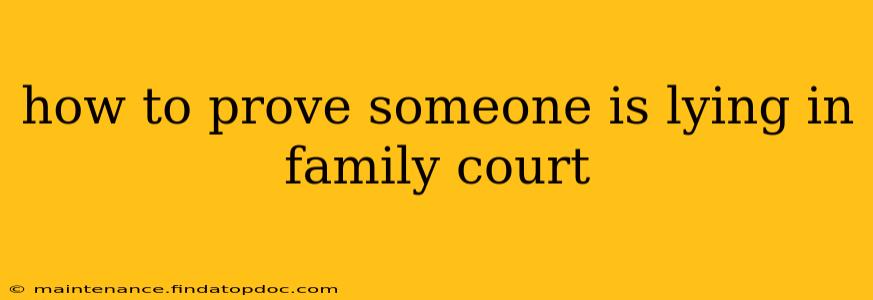How to Prove Someone is Lying in Family Court: A Difficult but Necessary Process
Navigating family court can be emotionally draining, especially when you suspect someone is being dishonest. Proving a lie, however, is a challenging legal undertaking requiring meticulous preparation and a strategic approach. This isn't about winning a "battle" but about presenting a compelling case built on evidence and truth. Remember, the court's primary focus is the well-being of the children involved.
Understanding the Burden of Proof: In family court, the standard of proof typically isn't "beyond a reasonable doubt" (as in criminal court), but rather a "preponderance of the evidence." This means the court needs to find it more likely than not that your claims are true. This lower bar still demands strong, verifiable evidence.
Gathering Evidence: The Cornerstone of Your Case
The key to successfully challenging a falsehood lies in meticulous evidence gathering. This requires a proactive and organized approach. Consider these avenues:
1. Documentation is King:
- Text messages, emails, and social media posts: These digital communications can provide concrete evidence of contradictory statements, admissions of guilt, or plans of action. Ensure you preserve these communications securely and appropriately.
- Financial records: Bank statements, pay stubs, credit card statements, and tax returns can reveal inconsistencies in claims about income, expenses, or assets.
- Medical records: If mental health or physical health is involved in the case, relevant medical records can corroborate or contradict claims. Obtain these with proper authorization.
- Photos and videos: Visual documentation can be powerful evidence. This may include photos of injuries, property damage, or even interactions that support your claims. Be sure to capture these responsibly and ethically.
- Witness statements: If others witnessed events that contradict the other party's claims, obtain written statements from them. Detailing specific dates, times, and locations is crucial.
2. Consistency is Key:
- Your own consistent testimony: Ensure your own statements remain consistent throughout the proceedings. Any discrepancies can weaken your credibility.
- Highlighting inconsistencies in the other party's statements: Carefully document inconsistencies between what they've said in court, in prior statements, or in written communication.
3. Expert Testimony:
In some cases, expert testimony might be necessary. Examples include:
- Forensic psychologists: Assessing the credibility of witnesses or evaluating the psychological impact on children.
- Financial experts: Analyzing financial records and identifying discrepancies.
- Child custody evaluators: Providing an objective assessment of the best interests of the child.
Frequently Asked Questions (PAAs):
How can I prove someone is lying about child abuse in family court? Proving child abuse requires substantial evidence. This typically includes medical records documenting injuries, photographs or videos of injuries, witness testimony, and consistent statements from the child (if they are old enough to articulate their experience, which needs to be handled carefully and in accordance with professional guidelines). The court will likely involve child protective services and possibly a forensic interviewer experienced in working with child victims.
What if the other parent is manipulating our child against me? This is a serious allegation requiring strong evidence. Documentation of interactions with the child (with the judge's approval), such as diaries, emails, or recorded conversations (where legally permissible) might help. Expert testimony from a child psychologist could be crucial in assessing the child's emotional state and potential manipulation. The court will likely focus on the child's best interests.
What happens if I lie in family court? Lying in court can have serious consequences. It can damage your credibility significantly, potentially leading to negative rulings against you. It could also lead to perjury charges, a criminal offense with potential fines and imprisonment.
Can I use social media posts as evidence in family court? Social media posts can be valuable evidence, but they must be properly authenticated and presented. Screen captures must be verified to prove their authenticity. The content must also be relevant to the case.
How do I deal with a dishonest lawyer? If you suspect your attorney is not acting in your best interests or engaging in dishonest practices, report your concerns to the relevant state bar association. Consider seeking a second opinion from another attorney.
Conclusion: Proving someone is lying in family court is a complex process demanding careful planning, comprehensive evidence gathering, and clear presentation. Remember to consult with a qualified family law attorney to ensure you understand your rights and options and build the strongest possible case. The well-being of the children should always be the paramount concern. This information is for educational purposes only and should not be considered legal advice.
